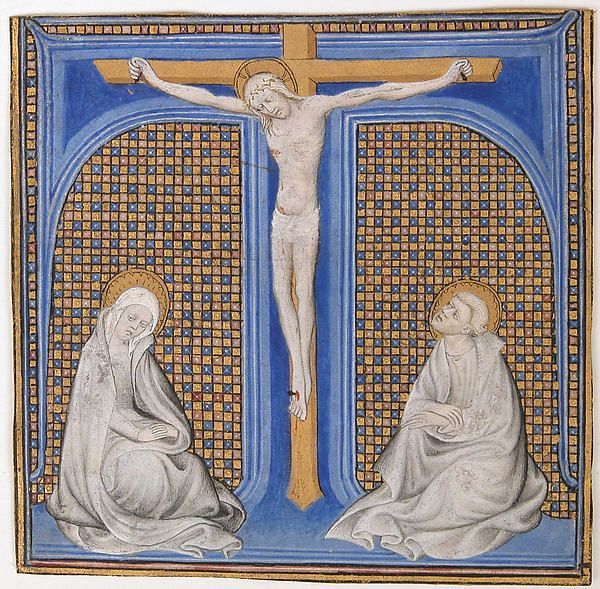Our Own Sins
Prayer: In the preparatory prayer I will beg God our Lord for grace that all my intentions, actions, and operations may be directed purely to the praise and service of his Divine Majesty.
Composition of place: a mental image. Here in this meditation on sin, the representation will be to see in imagination my soul as a prisoner in this corruptible body, and to consider my whole being, body and soul, as an exile here on earth.
Prayer of petition: I will ask God our lord for what I want and desire. In this meditation it is: growing and intense sorrow and tears for my sins.
The Knowledge of Ourselves
In the first book of Machabees we read that “All the army assembled together, and they went up into Mount Sion. And they saw the sanctuary desolate, and the altar profaned, and the gates burned. And they rent their garments, and made great lamentation, and put ashes on their heads: and they fell down to the ground on their faces, and they sounded with the trumpets of alarm, and they cried towards heaven” (1 Machabees 4, 37-40)
Having considered sin in others, we must enter into our own souls and realize how sin has worked therein.
It is a simple view of our past life –running through its stages, places where we have dwelt, offices, occupations that we have had, and our dealings with others.
And we must look at our souls as it truly stands before God.
It is the processus pecati. It is more than a material examination of conscience. It is to see the order that sin followed in my life. Sin came from this side, this led me to this, and this to this. Sins, in certain sense are united, and we need to see this union or link in order to discover them completely.
Looking at this chain of sins we are called to repeat the words of Saint Augustine, “I beg you, God, tell me where and when I was innocent.” Because, “You, O Lord forced me to look at myself, taking me from behind my back, where I had placed myself, unwilling to observe myself. You set me before my face, that I might see how foul I was… And I looked and stood terrified, and there was no escape for myself.” (Confessions, 8, 7)
What is Sin?
Sin is a fountain of dissatisfactions.
The prophet Jeremiah says, “My people have changed their glory for that which does not profit… for my people have committed two evils: they have forsaken me, the fountain of living waters, and hewed out (opened) cisterns for themselves, broken cisterns, that can hold no water. (Jeremiah 2: 10-13)
The sinner will never be satisfied. By nature, sin asks and asks, again and again. Sin is like a spoiled brat who asks without becoming tired.
The sinner will never be satisfied because sin brings a relative happiness. Sin really is poison wrapped in beautiful colors. Before the attraction of these colors the soul falls in love, but as soon as the poison touches the soul, it dies.
It is a relative happiness, because it lasts just a moment, and later disappears, like an illusion. And it really is an illusion. It is the illusion of giving to what is temporal and finite the value of infinite.
The soul has thirst for the Infinite, because the soul was created with the trademark of God, and God is the only Infinite. Consequently, no creature will satisfy the soul.
Sin is a deformity
Sin is disorder, ugliness in itself. When you hear a note that is out of tune. The reaction is natural; everybody knits the brow.
It is because sin is an attempt against harmony. It is an attack on the essential order of things, on the greatness of God, on the dignity of human nature. Every disorder is ugly, and sin is the greatest disorder.
Saint Augustine says, “Falling from God, falling from yourselves.” When man loses his reference towards God, he also loses his identity.
How many men and women were deformed by sin!
Sin is a sign of foolishness,
“The fool says in his heart, ‘There is no God.’” (Ps 14: 1)
The foolish man thinks that nobody is aware of his sin. He thinks that nobody will take care of it.
“They say, “The LORD does not see; the God of Jacob does not perceive.” Understand, O dullest of the people! Fools, when will you be wise? He who planted the ear, does he not hear? He who formed the eye, does he not see? He who chastens the nations, does he not chastise?” (Ps 94: 7-10)
Because of this, he is foolish. He doesn’t recognize that God is looking at him, and that God is laughing at him.
“He who sits in the heavens laughs; the LORD has them in derision.” (Ps 2: 4)
It is really funny. In every sinner we can see a little ant that thinks it has power enough to go against God. It is funny, and God who sits in the heavens laughs.
Sin above all is an offense against God. The king David had offended Bathsheba, wounding her honor; he had offended Uriah, Bathsheba’s husband, first taking his wife and later killing him; he had offended his own people with his public sin; however, he says: “Against you, you alone, have I sinned, what is evil in your sight I have done.” (Ps 51: 4)
Sin is a stain. It defiles the person in his most intimate spiritual life. Therefore, the Psalmist cries out: “Wash me thoroughly from my iniquity, and cleanse me from my sin” (Ps 50 [51]:2).
He is fully aware that sin is an evil, a reality that is hard to bear, because it has all the weight of his own conscience. Therefore, he says: “For I know my transgressions, and my sin is ever before me”.
He also knows that sin, this evil, which burdens the person’s soul, is an obstacle placed between the person and God.
“Against you, you alone, have I sinned, and done what is evil in your sight” (Ps 50 [51]:4).
So, we can see the two dimensions of sin: on one side the human being has conscience of what is good and what is evil and has conscience of his wrongdoing; on the other side, the human being has conscience of the greatness and holiness of God.
At that point it is possible to compare the contraries:
- God’s wisdom versus my ignorance
- God’s power versus my weakness
- God’s justice versus my iniquity
- God’s goodness versus my wickedness
And after this consideration we are the ones who can ask with deeply sorrow, “Why did I do such a thing?”
Wonder
Before my sins, a cry of wonder arises.
How is it that creatures have permitted me to live, and have sustained me in life!
Why have the heavens, sun, moon, stars, and the elements, the fruits, birds, fish, and other animals been at my service!
How is it that the earth did not open to swallow me up, and created new hells in which I should be tormented forever!
Why have the angels, though they are the sword of God’s justice, tolerated me, guarded me, and prayed for me!
Why have the saints interceded for me and asked favors for me!
This wonder is what leads the prophet Jeremiah to say, “be appalled, O heavens, at this, be shocked, be utterly desolate, says the LORD, for my people have committed two evils: they have forsaken me, the fountain of living waters, and hewed out cisterns for themselves, broken cisterns, that can hold no water.” (Jeremiah 2: 12-13)
However, God is not only the judge who knows all. He is at the same time the only One to whom man can cry:
“Blot out my transgressions”, blot them out according to your abundant mercy (cf. Ps 50 [51]:1)
“Blot out” means: “wipe out, my sins! Because you alone can do it! You alone!”
You alone can “wipe out”, because you alone can create.
Because of this the Psalmist cries out: “Create in me a clean heart, O God, and put a new and right spirit within me” (Ps 50 [51]:10). Restore my joy; create in me a pure heart.
Saint Ignatius point out at the end of this meditation three dialogues of mercy: one with Our Lady, another with Jesus Christ, and the last one with God the Father. This is a solemn dialogue, because the matter of this meditation and this conversation is very important.
In these dialogues I will ask three graces that are the objective of the first Ignatian week.
The first dialogue will be with Our Lady, that she may obtain these three favors from her Son:
- A deep knowledge of my sins and a feeling of scorn, contempt for them.
- An understanding of the disorder of my actions, that filled with horror of them, I may amend my life and put it in order;
- Knowledge of the world. That filled with horror, I may put away from me all that is worldly and vain.
After that I will say a Hail Mary.
In the second dialogue I will make the same petitions to her Son, that He may obtain these graces from the Father for me.
After that I will say a Soul of Christ.
In the third dialogue I will make the same requests of the Father that He Himself, the eternal Lord, may grant them to me.
Then I will close with the Our Father.

Take, Lord,
and receive all my liberty, my memory, my understanding, and my entire will, all that I have and possess. Thou hast given all to me. To Thee, O Lord, I return it. All is Thine, dispose of it wholly according to Thy will. Give me Thy love and Thy grace, for this is sufficient for me.
(Spiritual Exercises #234. Louis Puhl SJ, Translation.)



